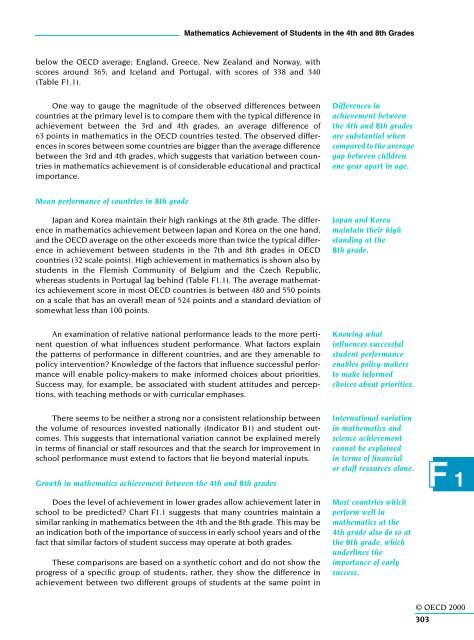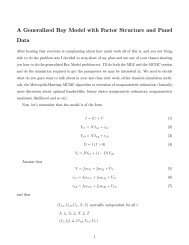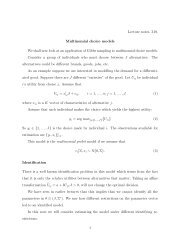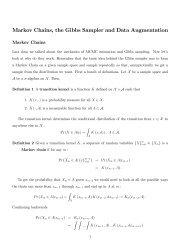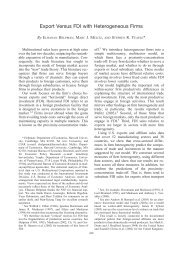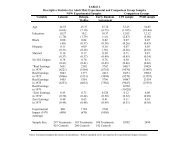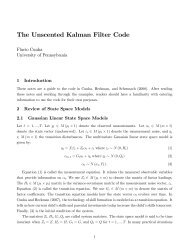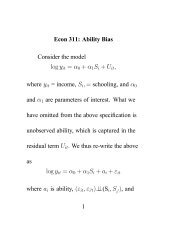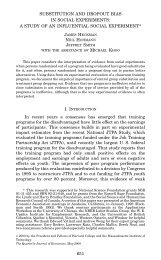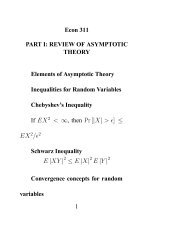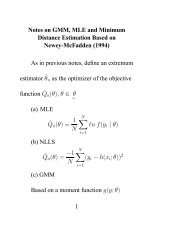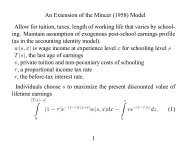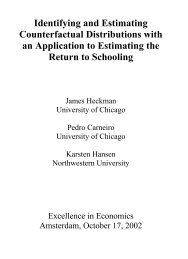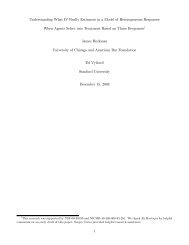OECD (2000)
OECD (2000)
OECD (2000)
You also want an ePaper? Increase the reach of your titles
YUMPU automatically turns print PDFs into web optimized ePapers that Google loves.
Mathematics Achievement of Students in the 4th and 8th Grades<br />
below the <strong>OECD</strong> average; England, Greece, New Zealand and Norway, with<br />
scores around 365; and Iceland and Portugal, with scores of 338 and 340<br />
(Table F1.1).<br />
One way to gauge the magnitude of the observed differences between<br />
countries at the primary level is to compare them with the typical difference in<br />
achievement between the 3rd and 4th grades, an average difference of<br />
63 points in mathematics in the <strong>OECD</strong> countries tested. The observed differences<br />
in scores between some countries are bigger than the average difference<br />
between the 3rd and 4th grades, which suggests that variation between countries<br />
in mathematics achievement is of considerable educational and practical<br />
importance.<br />
Differences in<br />
achievement between<br />
the 4th and 8th grades<br />
are substantial when<br />
compared to the average<br />
gap between children<br />
one year apart in age.<br />
Mean performance of countries in 8th grade<br />
Japan and Korea maintain their high rankings at the 8th grade. The difference<br />
in mathematics achievement between Japan and Korea on the one hand,<br />
and the <strong>OECD</strong> average on the other exceeds more than twice the typical difference<br />
in achievement between students in the 7th and 8th grades in <strong>OECD</strong><br />
countries (32 scale points). High achievement in mathematics is shown also by<br />
students in the Flemish Community of Belgium and the Czech Republic,<br />
whereas students in Portugal lag behind (Table F1.1). The average mathematics<br />
achievement score in most <strong>OECD</strong> countries is between 480 and 550 points<br />
on a scale that has an overall mean of 524 points and a standard deviation of<br />
somewhat less than 100 points.<br />
Japan and Korea<br />
maintain their high<br />
standing at the<br />
8th grade.<br />
An examination of relative national performance leads to the more pertinent<br />
question of what influences student performance. What factors explain<br />
the patterns of performance in different countries, and are they amenable to<br />
policy intervention Knowledge of the factors that influence successful performance<br />
will enable policy-makers to make informed choices about priorities.<br />
Success may, for example, be associated with student attitudes and perceptions,<br />
with teaching methods or with curricular emphases.<br />
Knowing what<br />
influences successful<br />
student performance<br />
enables policy-makers<br />
to make informed<br />
choices about priorities.<br />
There seems to be neither a strong nor a consistent relationship between<br />
the volume of resources invested nationally (Indicator B1) and student outcomes.<br />
This suggests that international variation cannot be explained merely<br />
in terms of financial or staff resources and that the search for improvement in<br />
school performance must extend to factors that lie beyond material inputs.<br />
Growth in mathematics achievement between the 4th and 8th grades<br />
Does the level of achievement in lower grades allow achievement later in<br />
school to be predicted Chart F1.1 suggests that many countries maintain a<br />
similar ranking in mathematics between the 4th and the 8th grade. This may be<br />
an indication both of the importance of success in early school years and of the<br />
fact that similar factors of student success may operate at both grades.<br />
These comparisons are based on a synthetic cohort and do not show the<br />
progress of a specific group of students; rather, they show the difference in<br />
achievement between two different groups of students at the same point in<br />
International variation<br />
in mathematics and<br />
science achievement<br />
cannot be explained<br />
in terms of financial<br />
or staff resources alone.<br />
Most countries which<br />
perform well in<br />
mathematics at the<br />
4th grade also do so at<br />
the 8th grade, which<br />
underlines the<br />
importance of early<br />
success.<br />
F 1<br />
© <strong>OECD</strong> <strong>2000</strong><br />
303


